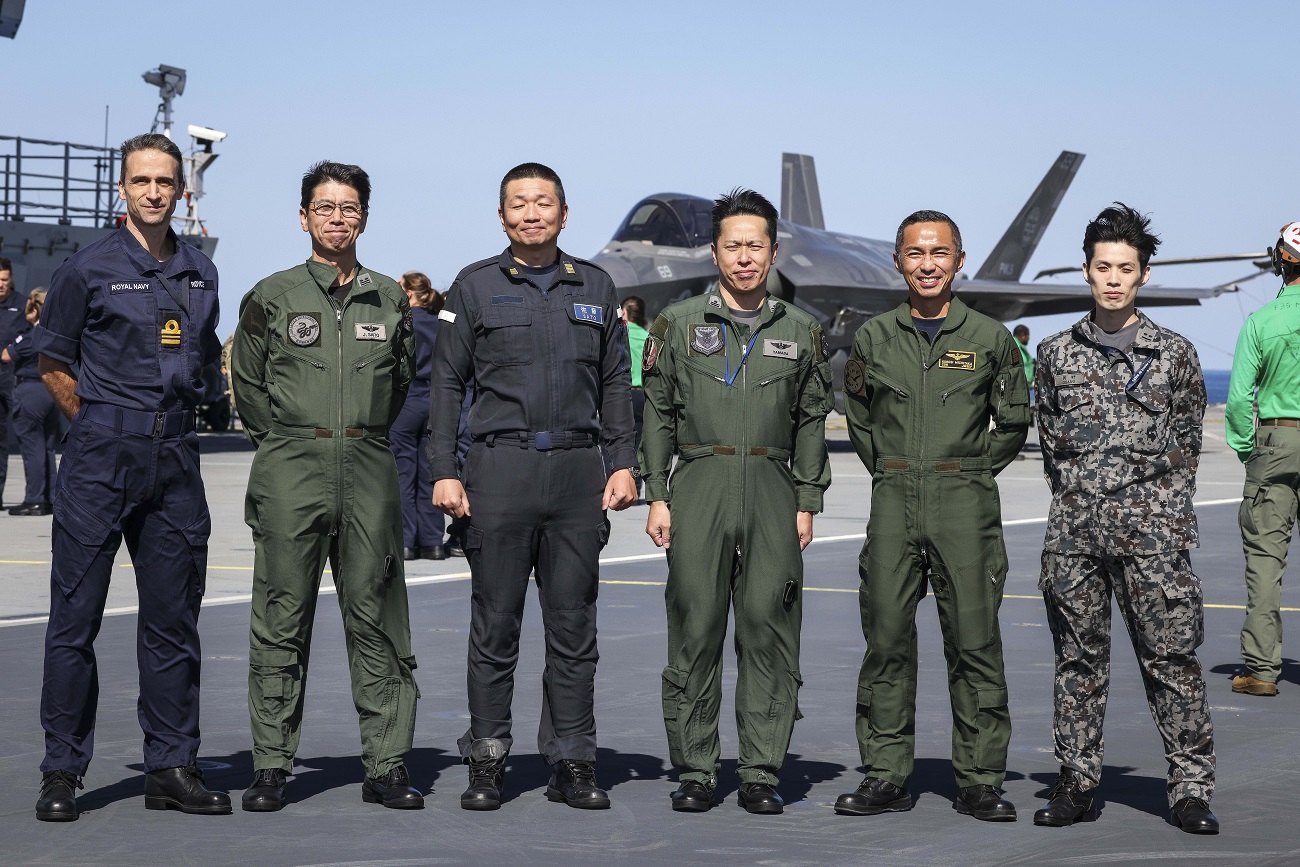Six senior Japanese officers watched F-35 operations on Britain’s biggest warship to help them introduce the jet into service. The delegation from the Japanese Maritime Self-Defence Force (JMSDF) joined HMS Prince of Wales for a fortnight of stealth fighter trials off the USA – helping to pave the way for their own trials in the same waters in 12 months’ time. The Japanese Maritime Self-Defence Force is modifying its Izumo-class helicopter carriers so they can operate the F-35B – already in service with the UK’s two carriers. Prince of Wales is conducting the third phase of complex trials with the jets – known as Development Test 3 (phases one and two were carried out aboard her sister HMS Queen Elizabeth) – extending the operating limits, increasing the sortie rate, testing payloads. To see what’s in store – and to learn about the ever-growing capabilities of fifth-generation carrier strike operations, Captain Sato Tsuyoshi, Izumo-class special modification programme lead, and five colleagues were shown every aspect of life aboard Prince of Wales off the Eastern Seaboard, not least deck operations. The two navies have been forging an ever-closer working relationship over the past decade, with increasing visits to Japan by RN vessels (not least HMS Queen Elizabeth herself on her 2021 maiden deployment) and Anglo-US-Japanese naval agreements.
“It has been my privilege to help HMS Prince of Wales host our friends and allies from the both the Japan Maritime Self-Defence Force and the Japan Air Self-Defence Force to share in an exchange of knowledge on all things Development Test and Carrier Strike. Hopefully it is the first of many such collaborations which might one day lead to full interoperability between our respective carrier strike groups – it is quite possible we will one day see a Japanese F-35B landing on the deck of HMS Prince of Wales. My sincere thanks to the ship’s company for their professionalism, enthusiasm and warm welcome when supporting this visit.,” said Lieutenant Commander Roderick Royce, who hosted the Japanese delegation.
Captain Sato JMSDF said: “It’s been an exciting study on board, seeing fixed wing operations as well as the traditions of the Royal Navy. The team have been so welcoming and without your support our study into operating F35-B for the Japanese Self-Defence Forces would not have been as successful.”

In December 2017, Japanese newspaper Yomiuri Shimbun reported that the Japanese government was considering modifying its Izumo-class helicopter destroyers to operate with roughly 10 F-35B aircraft. Multiple plans are reportedly under consideration, some of which call for US Marine Corps F-35s to use the vessels, but others for Japan to procure its own aircraft. The plan quickly raised criticism from China, where government officials reacted negatively and urged Japan to “act cautiously”. In February 2018, the Yomiuri Shimbun reported that the Japanese government was also considering a purchase of F-35Bs for the defence of remote islands. Cited sources claim the Japanese government may already be considering a purchase in the 2019 defence budget, which could see the first deliveries in 2024, and operational capability from 2026. In December 2018, the Japanese government approved the plan to procure an additional 105 F-35 aircraft, reportedly 63 of these are to be F-35A aircraft, and 42 F-35B aircraft. The plan increases Japan’s total F-35 aircraft ordered to 147. Initially, to save money, these additional aircraft were planned to not be assembled in Japan.
HMS Prince of Wales (R09) is the second Queen Elizabeth-class aircraft carrier of the Royal Navy. Unlike most large aircraft carriers, Prince of Wales is not fitted with catapults and arrestor wires, and is instead designed to operate STOVL aircraft; the ship is currently planned to carry up to 48 F-35B Lightning II stealth multirole fighters and Merlin helicopters for airborne early warning and anti-submarine warfare, although in surge conditions the class is capable of supporting 70+ F-35B. The design emphasises flexibility, with accommodation for 250 Royal Marines and the ability to support them with attack helicopters and troop transports up to and larger than Chinook size. Construction of the ship began in 2011 at Rosyth Dockyard and ended with launch on 21 December 2017. She was handed over to the Royal Navy in 2019. When on operations, Prince of Wales will form a central part of a UK Carrier Strike Group, comprising escorts and support ships, with the aim to facilitate carrier-enabled power projection.
















